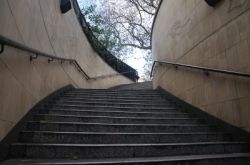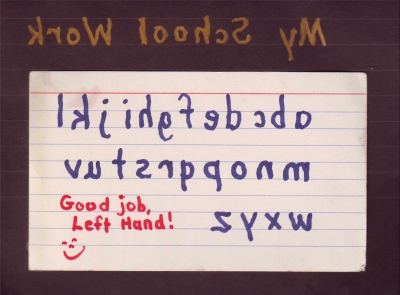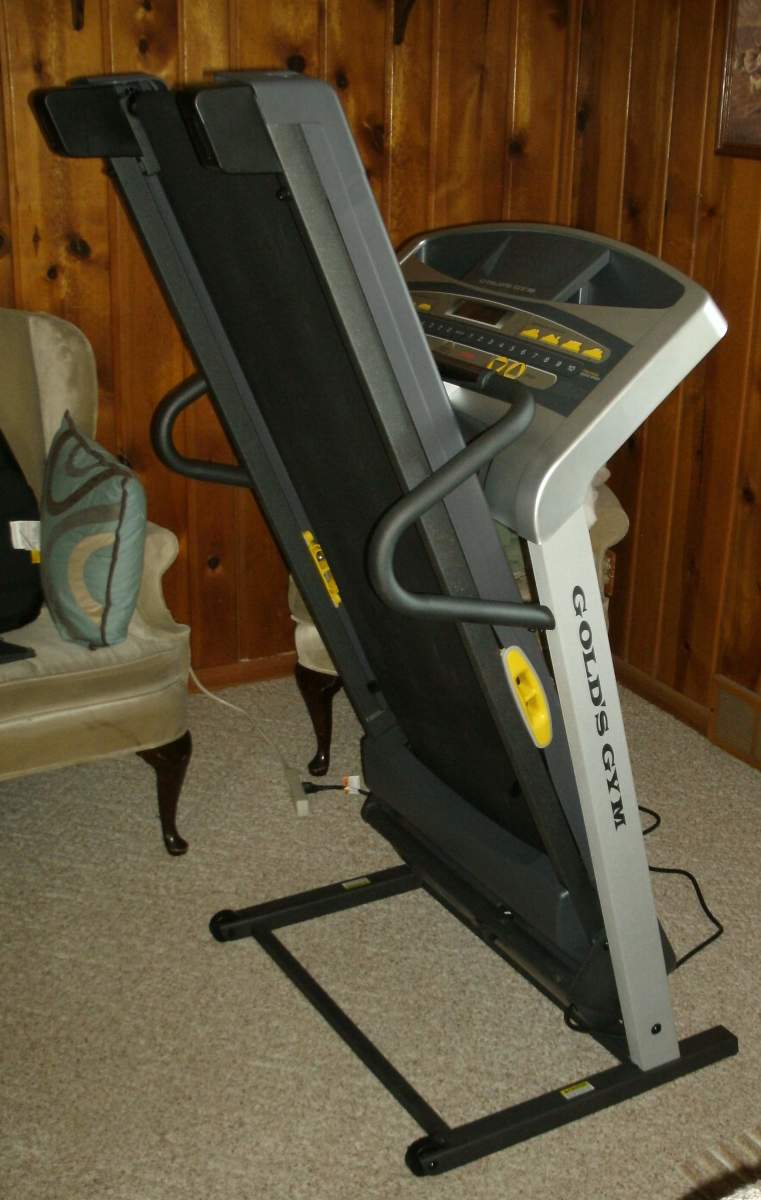Poor Spatial Skills: Path Integration

An Inability to Form Cognitive Maps?
Anecdote 1: I stood at a bus stop for nearly an hour the other evening. It took more than one mistake to place me there for such a long time. One mistake was that I was at the wrong bus stop -- and the most notable thing about that mistake was that I was standing at a bus stop where I regularly got off on Wednesday afternoons (when arriving in Issaquah, not when leaving).
This is how it happened: On my way home, my client always drops me off at the bus stop inside the nearby Park and Ride; it's a long route, and a bus driver informed me one week that standing at another stop outside the parking lot would get me home faster. I was hesitant because I do get lost so frequently, but a couple weeks later, I took the plunge. I was, I will admit, without glasses, but I don't think had much to do with what happened. I mean, I recognized the Park and Ride, I recognized the convenience store across the street, I even recognized the bus driver and the "Uh, oh," look he wore on his face when he realized I was waiting at the stop where he usually let me off. I recognized the things around me, but failed to recognize there was something wrong with my orientation toward them.
Anecdote 2: When I was in college, my dorm was two short blocks from the Student Union. Yet it took me a week longer to learn my way back from the Student Union than it did to learn the route there. If I had actually managed to walk home in two blocks, I would have learned it quicker, but, no, I took wrong turns and wandered all over campus. I knew my way there, but that made no difference whatsoever when I was faced with the separate task of getting home.
I think the turns were my source of difficulty. Most people would probably say there was only one turn involved in the whole trip, but, in fact, there were several -- even the process of leaving the path and walking through a door involves turning your body a couple times. For me, even a slight turn can be disorientating; more than a couple, and I might as well be playing Pin-the-Tail-on-the-Donkey. I can also get confused when I approach landmarks (like business parks or shopping centers) from different angles.
I first heard the term "cognitive map" in college. That refers to the ability to form a mental representation of space: It means that if you know the path from Point A to Point B well, you can reverse it and go from Point B to Point A. It means that in a reasonable amount of time, you put together some kind of representation of how A, B, C, and D all relate to each other.
From the moment I heard the term cognitive map, I had a suspicion it was something I didn't do much of. I can live or work in a building for years without understanding how the corridors and floors relate to each other or how the outside corresponds to the inside. If the building is much larger (or more complex) than a house, I memorize routes in a one-way manner; I continue to find my away around by trial and error.

... or a Problem with Path Integration?
and visual memory, perhaps?
I am not sure that "cognitive map" is the most precise term for what I am describing. Recently, I heard the term path integration. That has to do with the senses that we use to navigate; I believe that it primarily has to do with the nonvisual ones -- at least the studies that I saw discussed nonvisual ones. We also use proprioceptive and vestibular senses to help us find our way around; while I am no expert at how those senses work, I do know they have to do with sensing our own position in space and our movement through it.
I have had the experience of bending over slightly to retrieve my bus fare, losing my orientation and turning the opposite way (almost dropping my fare into the stairwell instead of the fare box). I am so easily disorientated that I suspect what I am doing goes beyond merely failing to encode information. I suspect that I am actually encoding a lot of contradictory information that simply makes no sense. (Maybe the act of walking back across the Park and Ride causes enough disorientation that I just don't have a sense that I am at the same place as was when I was going the other way?)
There is a visual element for me, but I think it has more to do with visual memory than failing to understand what I see.. I remember things very well -- if I narrate them or verbalize them to myself. Otherwise, it's in one eye, and out the other. It's gotten embarrassing at times. This is something that has happened more than once: I will ride home with a co-worker on a daily basis for an extended period of time, but when they ask me to retrieve something from their car, I will realize I have no idea what the car looks like. Some people chalk that up to being emotionally distracted, but the thing is, I'll remember almost word for word the conversations that took place in the car, just not the appearance of the car. I am actually far better than the average person when it comes to the "He saids," and the "She saids" -- but don't expect me to pick a vehicle out of a lineup. (Or a house, for that matter... but that's another story.)

Learning Disabilities and Expectation
There are some things that my mind doesn't do naturally -- yet I am obviously bright enough to figure them out and commit them to memory. Yes, my apartment building has a complex floor plan, and, yes, I most often go down by the elevator. But how do explain how, after six years in the building, I can head down one of the several staircases and have no idea which part of the first floor I will end up on? (And dare I mention that I am sitting here going, "I think there are three staircases, but I am not entirely certain"?)
Perhaps it has to do with expectation. When someone has a learning disability in a particular area, they grow up without any expectation that things in that particular area should make sense. My logical mind knows that things exist in a fixed relationship to each other, and that that relationship doesn't change when I approach them from a different angle. Yet that logic is at odds with how I've experienced the world since I was a tiny child. The way that I've experienced it is, to borrow a line from a song, "Just like a maze, where all of the walls all continually change." I have no experience of knowing what will be at the end of a corridor, and I have no real expectation of knowing.
I do still get lost in Seattle. I get around reasonably well in most areas because the streets are numbered. I navigate by number -- that much, at least, is predictable.Other strategies include leaving early, writing down directions (always verbally, never in map form), asking the bus driver to tell me when to get off and which way to walk. (The aforementioned driver was wearing the uh-oh look because he knew, direction-wise, I wasn't independent.)
Dog Demonstrates... the Complexity of Finding Your Way Around
The dog in this video is supposed to be demonstrating a very rudimentary cognitive map. The thing I like, though, is the way the camera captured the path around the door. it gives you a sense of just how complex a simple bit of architecture can be to someone who loses their orientation easily. (You might think you only turn once when you walk two blocks. How many times do you really turn?)
For me, open spaces make more sense than buildings. My understanding of space is largely bound by what I can see around me at a given moment. If I can't look back and see where I was a moment earlier, I get very confused, and I fail to place things in a coherent whole.
Right Writes Right, Left Writes Left

I can look at landmarks on the bus going to work -- and I can look at landmarks on the bus going home. Suddenly, a year later, I can have this "Eureka moment" and wonder if something I am looking at is the same something I was looking at when going the other way.
Different Kinds of Spatial Skills...
and the danger of not looking
I can look at a map and answer questions about it, but I can't make any connection between the paper map and the real world. The other day I was in a location I'd been before. I knew that I was walking from the west toward the east, but I struggled to figure out which way was north. I faced one way and then the other and tried to picture a little map in front of me. Why? Well...a map is is small and two-dimensional , and it has borders around it ; it's easy to look at it and identify east and west. In real life, though, if you point me north, and ask me which is east and which is west, I may struggle. If my brain isn't fresh, sometimes I get it wrong. This is one contributing factor to spend so much time lost!
It would seem unbelievable to a lot of people that I could have spatial issues. I handle a subgroup of spatial skills well. I can copy. My handwriting is neat, and I have good drawing skills, especially when I have a photograph in front of me. There are different kinds of spatial skills, though, and there are different systems used in processing space. As long as the scale is small, and there is little in the way of rotations or changes in direction, then I understand spatial relationships very well. But once you take those conditions away, things start to break down. And if I have to intuit space by moving through it, things break down to the point where it's simply staggering. There was one class I couldn't function in and that was PE. The teachers who watched me try to function knew there were serious problems; people who didn't watch couldn't believe that it would happen for any reason than a lack of trying.
The problem with being very sure that someone is good at something, is that failure is misinterpreted as psychological: The person is perceived as distracted, distressed, or too timid to try. I was in adaptive PE at one point; my family assumed I just didn't try. Sometimes they'd get angry at me. As a child, I would get angry back. It's actually some of the other assumptions that have pained me more over the years. (Was I unable to pass driver's ed because of timidity/ fear -- or because the skill was actually difficult for me?) I remember that when we went to the in-school lab to do simulated driving (no real wheels involved and each of us firmly rooted to our seat) my scores were far below those of anyone else in the class. Our lab scores didn't effect our grade -- only our written work and attendance -- so I got an A. That was cool, but it wasn't cool that no one tried to help me.
Estimating time and distance doesn't come naturally to me either. I've gotten quicker at crossing streets in the past decade. I had a housemate some years back who insisted (not just to me, but to others) that I was afraid to cross the street by myself. That was because I hesitated longer than most people at intersections that didn't have lights. I knew I wasn't experiencing fear, but I didn't know how to explain what I was experiencing. When I was young, all I knew how to do was say, "That's not true,"... in a voice that I knew sounded hollow.

Looking for Clues
I study pictures of my brother and me: noting the differences in our facial features, the way we hold our bodies... the way he was big for his age while I tended to look a year or two younger than mine. It's not that there's something wrong with any of that. But I do know that there are more than 200 genetic aberrations that have at least a subtle effect on features. Some are nonspecific. The child that has some genetic error is apt to be smaller than siblings, have a low nasal bridge and epicanthal folds, an open mouth, low muscle tone, various minor anomalies. I was a tiny little thing, but I had a dozen gray hairs by age thirteen or so. These are the sorts of things that may not matter at all... or may give clues to things that do matter.
More Resources
- Visual Spatial Skills
For teachers: a general page on visual spatial skills and strategies. - Research on Cognitive Maps
This focuses on animals, but it also gives a sense of what cognitive map means -- for people who like to read a lot. - The Hippocampus in Navigation
There are multiple brain systems used in both memory and navigation - research is ongoing.





